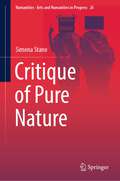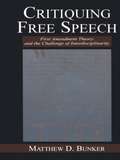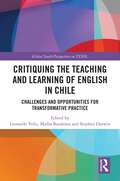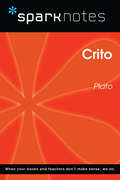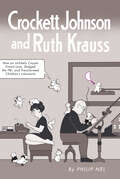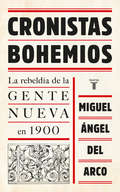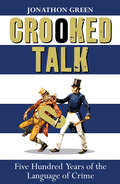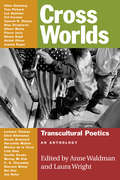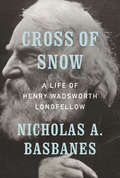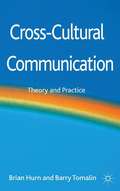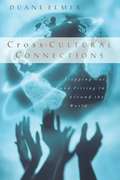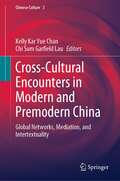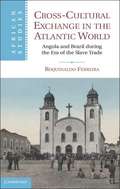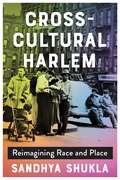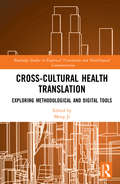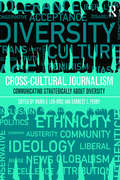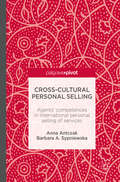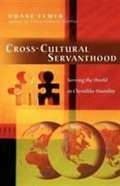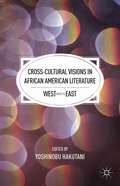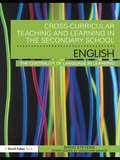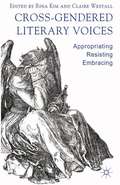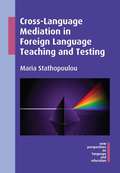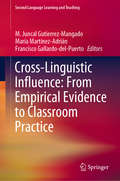- Table View
- List View
Critique of Practical Reason (SparkNotes Philosophy Guide)
by SparkNotesCritique of Practical Reason (SparkNotes Philosophy Guide) Making the reading experience fun! SparkNotes Philosophy Guides are one-stop guides to the great works of philosophy–masterpieces that stand at the foundations of Western thought. Inside each Philosophy Guide you&’ll find insightful overviews of great philosophical works of the Western world.
Critique of Pure Nature (Numanities - Arts and Humanities in Progress #26)
by Simona StanoThis book challenges the Western contemporary “praise for Nature”. From food to body practices, from ecological discourses to the Covid-19 pandemic, contemporary imaginaries abound with representations of an ideal “pure Nature”, essentially defined according to a logic of denial of any artificial, modified, manipulated — in short, cultural — aspect.How should we contextualise and understand such an opposition, especially in light of the rich semantic scope of the term “nature” and its variability over time? And how can we — if we actually can — envisage alternative models and approaches capable of better accounting for such richness and variability? The author addresses these fundamental issues, combining an initial theoretical problematisation of the concept of nature and its evolution — from classical philosophy to the crucial changes occurred through the Middle Ages, the Renaissance, Romanticism and the modern era, finally considering recent insights in philosophy, sociology, cultural anthropology and semiotics — with the analysis of its discursivisation — from the iconography of Mother Nature between the past and the present to the representation of catastrophic events in fictional and non-fictional texts, from clean eating and other popular food trends to the ambivalence of the naked body between its supposed natural ascription and its multiple cultural characterisations. Thus she introduces a critique of pure Nature, providing a systematic study of the way nature is attributed meaning and value in some of today’s most relevant discourses and practices, and finally tracing a possible path towards an “internatural turn”.
Critiquing Free Speech: First Amendment theory and the Challenge of Interdisciplinarity (Routledge Communication Series)
by Matthew D. BunkerIn this exceptional volume, Matthew D. Bunker explores the work of contemporary free speech critics and argues that, while at times these critics provide important lessons, many of their conclusions must be rejected. Moreover, Bunker suggests that we be wary of interdisciplinary approaches to free speech theory that--by their very assumptions and techniques--are a poor "fit" with existing free speech theory and doctrine. In his investigation of diverse critiques of free speech theory and his sophisticated rebuttal, he provides an innovative and important examination of First Amendment theory. In doing so, he establishes a new agenda for First Amendment theory scholarship that incorporates some of the critics' insights without abandoning the best aspects of the free speech tradition. COPY FOR MAILER: Distinctive features in this volume include: * an overview of the traditional approaches to First Amendment theory, * an examination of work from key First Amendment scholars and theorists, at both the individual and group level, * an emphasis on interdisciplinarity ranging from femi- nist and critical legal scholars to economists and literary theorists, and * a new agenda for First Amendment theory scholar- ship which incorporates critical comment while pre- serving the best aspects of the free speech tradition.
Critiquing the Teaching and Learning of English in Chile: Challenges and Opportunities for Transformative Practice (Global South Perspectives on TESOL)
by Stephen Darwin Darío Luis Banegas Malba Barahona Leonardo Veliz Loreto Abarzúa Silva Rommy Anabalón Schaaf María Cristina Arancibia Natalia Asenjo Roxana Balbontín-Alvarado Corinne Barger Víctor Birkner Diego Cabezas Bravo Tatiana Cárcamo Rojas Tamara Cortés Seitz Martha Epperson Eric Gómez Burgos Alexia Guerra Rivera Pamela Lara-Morales Paulina Moya-Santiagos Carolina Muñoz Muñoz, Belén Alicia Páez Nykoll Pinilla-Portiño Camilo Ramos-Gálvez Priscila Riffo-Salgado Margarita Ulloa Toro, María Yasna Yilorm BarrientosThis edited volume challenges the hegemonic values and practices that have shaped the contemporary state of English language education in Chile, offering a space for a transformative vision that prioritises pedagogical practices grounded in (g)localised methodologies and epistemologies.Providing insights into English language teacher education and the pedagogical practices that teachers enact in diverse contexts, chapters delve into a critical scrutiny of prevalent issues in ELT education and explore new opportunities for innovation, reconsideration and reconceptualisation of policy and practice. Motivated by the drive for transformative, context-sensitive and culturally relevant practice, contributors critically engage with the socio-cultural and socio-political context of Chilean English language researchers, offering a systematic analysis of the profound effects of entrenched neoliberal ideologies in education, as well as how these act to influence and shape teaching practices, policies, and outcomes. In highlighting the inherent limitations and inequities perpetuated by neoliberal policies, contributors offer alternative perspectives and solutions designed to promote more equitable, inclusive, and socially just second language educational practices.Providing a comprehensive examination of the intricate relationship between Chile's political history, socio-economic evolution, and the rise of English language education, this book will be of interest to scholars, researchers, and postgraduate students in the fields of applied linguistics, teaching and learning English as a foreign/second language, and initial English language teacher education. Policy makers working in ELT in the Chilean context may also find the volume of use.
Crito (SparkNotes Philosophy Guide)
by SparkNotesCrito (SparkNotes Philosophy Guide) Making the reading experience fun! SparkNotes Philosophy Guides are one-stop guides to the great works of philosophy–masterpieces that stand at the foundations of Western thought. Inside each Philosophy Guide you&’ll find insightful overviews of great philosophical works of the Western world.
Crockett Johnson and Ruth Krauss: How an Unlikely Couple Found Love, Dodged the FBI, and Transformed Children's Literature (Children's Literature Association Series)
by Philip NelWinner of the Children’s Literature Association’s 2014 Honor Book AwardCrockett Johnson (born David Johnson Leisk, 1906–1975) and Ruth Krauss (1901–1993) were a husband-and-wife team that created such popular children's books as The Carrot Seed and How to Make an Earthquake. Separately, Johnson created the enduring children's classic Harold and the Purple Crayon and the groundbreaking comic strip Barnaby. Krauss wrote over a dozen children's books illustrated by others, and pioneered the use of spontaneous, loose-tongued kids in children's literature. Together, Johnson and Krauss's style—whimsical writing, clear and minimalist drawing, and a child's point-of-view—is among the most revered and influential in children's literature and cartooning, inspiring the work of Maurice Sendak, Charles M. Schulz, Chris Van Allsburg, and Jon Scieszka. This critical biography examines their lives and careers, including their separate achievements when not collaborating. Using correspondence, sketches, contemporary newspaper and magazine accounts, archived and personal interviews, author Philip Nel draws a compelling portrait of a couple whose output encompassed children's literature, comics, graphic design, and the fine arts. Their mentorship of now-famous illustrator Maurice Sendak (Where the Wild Things Are) is examined at length, as is the couple's appeal to adult contemporaries such as Duke Ellington and Dorothy Parker. Defiantly leftist in an era of McCarthyism and Cold War paranoia, Johnson and Krauss risked collaborations that often contained subtly rendered liberal themes. Indeed, they were under FBI surveillance for years. Their legacy of considerable success invites readers to dream and to imagine, drawing paths that take them anywhere they want to go.
Cronistas bohemios: La rebeldía de la Gente Nueva en 1900
by Miguel Angel del ArcoEl retrato de una época legendaria para la esfera intelectual española y el sector del periodismo, a través de cinco de sus protagonistas. Alrededor de 1900 las redacciones de los periódicos estaban repletas de bohemios que acudían allí para calentarse o para demandar una colaboración. Pero no todos eran hampones y pedigüeños. Entre ellos había literatos de altura que pasaron a la historia como la Gente Nueva y fueron coetáneos, compañeros de café y colegas de modernistas y noventayochistas. Algunos de ellos fueron auténticos pioneros, los primeros corresponsales, cronistas y reporteros, y conformaron los inicios del periodismo moderno. Además de una magnífica contextualización histórica y la descripción de las relaciones entre el periodismo y bohemia de aquel tiempo, Cronistas bohemios reúne algunos de los mejores textos -precedidos de un perfil de cada autor-, excelente muestra de las grandes aportaciones de esta bohemia a la historia del periodismo, esencialmente en el lenguaje (basado en la paradoja y el uso de la palabra como explosivo), el contenido (de calado social) y el humor(a menudo ácido, incluso negro). Los cinco autores aquí reunidos son Antonio Palomero, Alejandro Sawa, Pedro Barrantes, Joaquín Dicenta y Luis Bonafoux, nombres que hoy no representan gran cosa. Sin embargo, estos textos tienen muy poco que envidiar, en calidad, en estilo, en atrevimiento y en novedoso enfoque, a lo que muchos años después conoceríamos como nuevo periodismo. Se pueden leer, hoy mismo, con gusto y asombro. Reseñas:«Además de una magnífica contextualización histórica y la descripción de las relaciones entre periodismo y bohemia de aquel tiempo, Cronistas bohemios reúne algunos de los mejores textos, precedidos de un perfil de cada autor, excelente muestra de las grandes aportaciones de esta bohemia a la historia del periodismo, esencialmente en el lenguaje (basado en la paradoja y el uso de la palabra como explosivo), el contenido (de calado social) y el humor (a menudo ácido, incluso negro).»Todo Literatura «No dejaron huella aparente en el oficio. La Guerra Civil partió en dos el rastro de aquellos hombres en beneficio de una amnesia triunfal que borró su estela. Pero de esos días delirantes quedan sus crónicas y el peso de leyenda que los enclavijó en la bohemia cuando en verdad fueron algo más. En un entorno de sacamantecas, feriantes de café y colmeneros del hambre y la cazalla, dibujaron un periodismo de buen paño que se levantó en los periódicos, en las redacciones de vinagre y ruido, en el fervor de un Madrid sacudido de miseria y sediento de honor, síntomas de una época tremenda y feliz. De una forma de hacer periódicos con el ideal puesto en el último café que cierra más allá de la madrugada.»Antonio Lucas, El Mundo
Crooked Talk: Five Hundred Years of the Language of Crime
by Jonathon GreenThe language of crime has a long and venerable history - in fact, the first collection of words specifically used by criminals, Hye-Way to the Spittel House, dates from as early as 1531. Jonathon Green is our national expert on slang, and in Crooked Talk he looks at five hundred years of crooks and conmen - from the hedge-creepers and counterfeit cranks of the sixteenth century to the blaggers and burners of the twenty-first - as well as the swag, the hideouts, the getaway vehicles and the 'tools of the trade'. Not to mention a substantial detour into the world of prisons that faced those unlucky enough to be caught by the boys in blue. If you have ever wondered when the police were first referred to as pigs, why prison guards became known as redraws, or what precisely the subtle art of dipology involves, then this book has all the answers.
Cross Worlds
by Laura Wright Anne WaldmanCross Words refers to cultural hybrids, trans-cultural alliances, and associations. This fascinating compendium documents--in essays, conversations, and socratic raps--the vital work poets perform when they write across borders.Anne Waldman is the author of more than forty collections of poetry, the editor of numerous anthologies, and, for The Iovis Trilogy, the winner of the Shelley Memorial Award and the USA PEN Center Award for Poetry. She is a chancellor of the Academy of American Poets.Laura E. Wright is a poet, translator, and librarian. With Anne Waldman, she co-edited Beats at Naropa (Coffee House Press, 2009).
Cross of Snow: A Life of Henry Wadsworth Longfellow
by Nicholas A. BasbanesA major literary biography of America's best-loved nineteenth-century poet, the first in more than fifty years, and a much-needed reassessment for the twenty-first century of a writer whose stature and celebrity were unparalleled in his time, whose work helped to explain America's new world not only to Americans but to Europe and beyond. From the author of On Paper ("Buoyant"--The New Yorker; "Essential"--Publishers Weekly), Patience and Fortitude ("A wonderful hymn"--Simon Winchester), and A Gentle Madness ("A jewel"--David McCullough).In Cross of Snow, the result of more than twelve years of research, including access to never-before-examined letters, diaries, journals, notes, Nicholas Basbanes reveals the life, the times, the work--the soul--of the man who shaped the literature of a new nation with his countless poems, sonnets, stories, essays, translations, and whose renown was so wide-reaching that his deep friendships included Charles Dickens, Nathaniel Hawthorne, Ralph Waldo Emerson, Julia Ward Howe, and Oscar Wilde.Basbanes writes of the shaping of Longfellow's character, his huge body of work that included translations of numerous foreign works, among them, the first rendering into a complete edition by an American of Dante's Divine Comedy. We see Longfellow's two marriages, both happy and contented, each cut short by tragedy. His first to Mary Storer Potter that ended in the aftermath of a miscarriage, leaving Longfellow devastated. His second marriage to the brilliant Boston socialite--Fanny Appleton, after a three-year pursuit by Longfellow (his "fiery crucible," he called it), and his emergence as a literary force and a man of letters.A portrait of a bold artist, experimenter of poetic form and an innovative translator--the human being that he was, the times in which he lived, the people whose lives he touched, his monumental work and its place in his America and ours.
Cross-Cultural Communication
by Barry Tomalin Brian J. HurnA comprehensive survey of the key areas of research in cross-cultural communication, based on the authors' experience in organizing and delivering courses for undergraduate and postgraduate students and in business training in the UK and overseas.
Cross-Cultural Connections in Crime Fictions
by Vivien Miller Helen OakleyA collection of ten original essays forging new interdisciplinary connections between crime fiction and film, encompassing British, Swedish, American and Canadian contexts. The authors explore representations of race, gender, sexuality and memory, and challenge traditional categorisations of academic and professional crime writing.
Cross-Cultural Connections: Stepping Out and Fitting In Around the World
by Duane H. ElmerThis book intends to help the reader become aware of the realities in making a cultural transition--in business, in short- or long-term missions, as a bivocational person.
Cross-Cultural Encounters in Modern and Premodern China: Global Networks, Mediation, and Intertextuality (Chinese Culture #3)
by Kelly Kar Yue Chan Chi Sum Garfield LauThis book presents an essential contribution to approaches in the studies of film, literature, performance, translation, and other art forms within the Chinese cultural tradition, examining East-West cultural exchange and providing related intertextual dialogue. The assessment of cultural exchange in the East-West context involves the original source, the adapted text, and other enigmatic extras incurred during the process. It aims to evaluate the linkage among, but not limited to, literature, film, music, art, and performance. The sections unpack how canonical texts can be read anew in modern society; how ideas can be circulated around the world based on translation, adaptation, and reinvention; and how the global networks of circulation can facilitate cultural interaction and intervention. The authors engage discussions on longstanding debates and controversies relating to Chinese literature as world literature; reconciliations of cultural identity under the contemporary waves of globalization and glocalization; Chinese-Western film adaptations and their impact upon cinematic experiences; an understanding of gendered roles and voices under the social gaze; and the translation of texts from intertextual angles. An enriching intellectual, intertextual resource for researchers and students enthusiastic about the adaptation and transformation process of different genres, this book is a must-have for Sinophiles. It will appeal to world historians interested in the global networks of connectivity, scholars researching cultural life in East Asia, and China specialists interested in cultural studies, translation, and film, media and literary studies.
Cross-Cultural Exchange in the Atlantic World
by Roquinaldo FerreiraThis book argues that Angola and Brazil were connected, not separated, by the Atlantic Ocean. Roquinaldo Ferreira focuses on the cultural, religious, and social impacts of the slave trade on Angola. Reconstructing biographies of Africans and merchants, he demonstrates how cross-cultural trade, identity formation, religious ties, and resistance to slaving were central to the formation of the Atlantic world. By adding to our knowledge of the slaving process, the book powerfully illustrates how Atlantic slaving transformed key African institutions, such as local regimes of forced labor that predated and coexisted with Atlantic slaving, and made them fundamental features of the Atlantic world's social fabric.
Cross-Cultural Harlem: Reimagining Race and Place
by Sandhya ShuklaOver the course of the twentieth and twenty-first centuries, Harlem has been the capital of both Black America and a global African diaspora, an early home for Italian and Jewish immigrant communities, an important Puerto Rican neighborhood, and a representative site of gentrification. How do we understand the power of a place with so many claims and identifications? Drawing on fiction, sociology, political speech, autobiography, and performance, Sandhya Shukla develops a living theory of Harlem, in which peoples of different backgrounds collide, interact, and borrow from each other, even while Blackness remains crucial.Cross-Cultural Harlem reveals a dynamic of exchange that provokes a rethinking of spaces such as Black Harlem, El Barrio, and Italian Harlem. Cross-cultural encounters among African Americans, West Indians, Puerto Ricans, Jews, and Italians provide a story of multiplicity that challenges the framework of territorial enclaves. Shukla illuminates the historical processes that have shaped the diversity of Harlem, examining the many dimensions of its Blackness—Southern, African, Caribbean, Puerto Rican, and more—as well as how white ethnicities have been constructed. Considering literary and historical examples such as Langston Hughes’s short story “Spanish Blood,” the career of the Italian American left-wing Harlem congressman Vito Marcantonio, and the autobiography of Puerto Rican–Cuban writer Piri Thomas, Shukla argues that cosmopolitanism and racial belonging need not be seen as contradictory. Cross-Cultural Harlem offers a vision of sustained dialogue to respond to the challenges of urban transformations and to affirm the future of Harlem as actual place and global symbol.
Cross-Cultural Health Translation: Exploring Methodological and Digital Tools (Routledge Studies in Empirical Translation and Multilingual Communication)
by Meng JiHealth translation represents a critical yet underexplored research field in Translation Studies. High-quality health translation represents an integral part in the development of multicultural health resources. The empirical study and evaluation of health translations, and the establishment of effective health translation methods and models, holds the key to the success of multicultural health communication and promotion. Chapters in this book aim to fill in a persistent knowledge gap in current multicultural health research, that is, culturally effective and user-oriented healthcare translation. Research presented in this book points to an important opportunity to improve and enhance current multicultural healthcare services based on empirical, evidence-based health translation studies. Health translation provides a powerful intervention tool to engage with migrants with diverse language, cultural backgrounds and health literacy levels. This book provides much-needed reading in the emerging research field of healthcare translation. It makes useful and original contributions to this emerging research field through the exploration of culturally effective health translation methods, approaches and models, as well as the development and evaluation of digital health translation resources and tools.
Cross-Cultural Journalism: Communicating Strategically About Diversity
by Earnest Perry María Len-RíosBuilt on the hands-on reporting style and curriculum pioneered by the University of Missouri, this introductory textbook teaches students how to write about and communicate with people of backgrounds that may be different from their own, offering real-world examples of how to practice excellent journalism and strategic communication that take culture into account. Specifically, the book addresses how to: engage with and talk across difference; identify the ways bias can creep into our communications, and how to mitigate our tendencies toward bias; use the concept of fault lines and approach sources and audiences with humility and respect; communicate with audiences about the complexity inherent in issues of crime, immigration, sports, health inequalities, among other topics; interpret census data categories and work with census data to craft stories or create strategic campaign strategies; reconsider common cultural assumptions about race, class, gender, identity, sexual orientation, immigration status, religion, disability, and age, and recognize their evolving and constructed meaning and our role as professional communicators in shaping national discussions of these issues. In addition to its common sense, practical approach, the book's chapters are written by national experts and leading scholars on the subject. Interviews with award-winning journalists, discussion questions, suggested activities, and additional readings round out this timely and important new textbook. Supplemented by a companion website featuring additional case studies and examples of best practice, Cross-Cultural Journalism offers journalists and other communication professionals the conceptual framework and practical know-how they need to report and communicate effectively about difference.
Cross-Cultural Personal Selling: Agents’ Competences in International Personal Selling of Services
by Anna Antczak Barbara A. SypniewskaProviding in-depth analysis, this book enables readers to understand the theoretical aspects of personal selling and explores the difficulties of selling services which are sensitive to cultural, age and gender differences, and to customers originating from diverse cultural zones. Agents and personal sellers must be aware of these differences and be familiar with the expectations of customers. Cross-cultural Personal Selling provides extensive empirical research results with special emphasis on competences, skills and qualifications of personal sellers which are necessary for successful, effective and efficient promotion campaigns aimed at customers from different cultures. Academics of international marketing and promotion will find this study extremely useful, as well as practitioners looking to expand their knowledge on personal selling.
Cross-Cultural Servanthood: Serving The World in Christlike Humility
by Duane ElmerDuane Elmer asked people around the world how they felt about Western missionaries. The response? "Missionaries could be more effective if they did not think they were better than us. "The last thing we want to do in cross-cultural ministry is to offend people in other cultures. Unfortunately, all too often and even though we don't mean it, our actions communicate superiority, paternalism, imperialism and arrogance. Our best intentions become unintentional insults. How can we minister in ways that are received as true Christlike service? Cross-cultural specialist Duane Elmer gives Christians practical advice for serving other cultures with sensitivity and humility. With careful biblical exposition and keen cross-cultural awareness, he shows how our actions and attitudes often contradict and offend the local culture. He offers principles and guidance for avoiding misunderstandings and building relationships in ways that honor others. Here is culturally-savvy insight into how we can follow Jesus' steps to become global servants. Whether you're going on your first short-term mission trip or ministering overseas for extended periods, this useful guide is essential reading for anyone who wants to serve effectively in international settings with grace and sensitivity.
Cross-Cultural Visions in African American Literature
by Yoshinobu HakutaniThe most influential East-West artistic, cultural, and literary exchange that has taken place in modern and postmodern times was the reading and writing of haiku. Here, esteemed contributors investigate the impact of Eastern philosophy and religion on African American writers such asRichard Wright, Ralph Ellison, and Toni Morrison, offering a fresh field of literary inquiry. "
Cross-Curricular Teaching and Learning in the Secondary School ... English: The Centrality of Language in Learning
by David StevensWhat is the role of the individual school 'subject' and 'subject teacher' within school? Is it to teach a set of core subject knowledge, skills and understanding in a way that remains faithful to long-standing subject cultures and pedagogies? Or is there another way to consider how the curriculum and the notion of individual subjects and teachers' pedagogy could be constructed? Cross-Curricular Teaching and Learning in the Secondary School ... English brings together ongoing debates about personalised learning, creativity and ICT in education to establish a clear theoretical framework for cross-curricular teaching and learning in English and literacy. Presenting an appropriate pedagogy for cross-curricular teaching that draws on this framework, it promotes radical new approaches to English teaching as part of a widened curriculum through practical examples and theoretical discussions, blended with engaging stories of current practice. With links to other curriculum subjects and current education policy, features include: theoretical examination of key issues; assessment of the strengths and weaknesses of different curricular models; clear principles for effective assessment; a wide range of case studies; summaries of key research linked to suggestions for further reading; professional development activities to promote cross-curricular dialogue. Part of the Cross-Curricular Teaching and Learning in the Secondary School series, this timely, interdisciplinary textbook is essential reading for all students on Initial Teacher Training courses and practising teachers looking to holistically introduce cross-curricular themes and practices in secondary English teaching.
Cross-Gendered Literary Voices
by Rina Kim Claire WestallThis book investigates male writers' use of female voices and female writers' use of male voices in literature and theatre from the 1850s to the present, examining where, how and why such gendered crossings occur and what connections may be found between these crossings and specific psychological, social, historical and political contexts.
Cross-Language Mediation in Foreign Language Teaching and Testing
by Maria StathopoulouThis book contributes to the growing field of foreign language teaching and testing by shedding light on mediation between languages. Stathopoulou offers an empirically-grounded definition of mediation as a form of translanguaging and offers tools and methods for further research in multilingual testing. The book explores what cross-language mediation entails, what processes and strategies are involved, and the challenges often faced by mediators. As well as stressing the importance of administering tests which favour cross-language mediation practices, the author encourages the implementation of language programmes which promote the mingling-of-languages idea and target the development of language learners' effective translanguaging practices. Researchers studying translanguaging, multilingualism, multilingual testing and the use of mother tongue in the foreign language classroom will all find this book of interest.
Cross-Linguistic Influence: From Empirical Evidence to Classroom Practice (Second Language Learning and Teaching)
by M. Juncal Gutierrez-Mangado María Martínez-Adrián Francisco Gallardo-del-PuertoThis book presents the latest research in various areas of cross-linguistic influence (CLI), providing educators with insights into how previously learned languages influence the learning of an additional language at different levels, such as phonetics/phonology, morphosyntax, vocabulary, pragmatics, writing style and learning context. While the majority of the chapters have English as the target language, one investigates the acquisition of French. The L1s of the learners include Arabic, Basque, Catalan, Chinese, Czech, Danish, Finnish, Galician, Georgian, German, Norwegian, Polish, Russian, Spanish and Swedish. Each chapter ends with a reflection on possible pedagogical implications of the findings and offers recommendations on how to make the most of cross-linguistic influence in the classroom.

